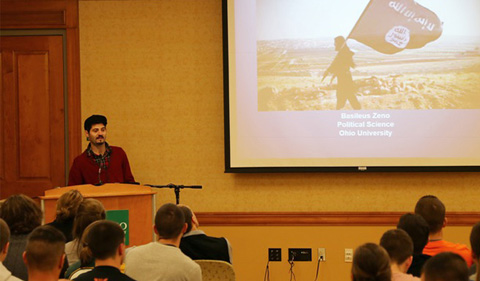
Basileus Zeno addressed a War and Peace curricular theme crowd in 2015 at Ohio University on the sources of ISIS.
BBC Newshour Extra interviewed Ohio University alum Basil Zeno ’15M as part of a piece on “After Aleppo?”
Zeno earned a M.A. in Political Science from the College of Arts & Sciences. He is now a Ph.D. student in Political Science at the University of Massachusetts, Amherst.
What should we make of the growing influence of Iran in the politics of the region? Along with Russia, Iran has been a key ally to President Assad in turning the tide the Syrian conflict. So is it right to cast this as the growing dominance of Shia powers and their allies over their Sunni rivals, or is this an over-simplistic interpretation of a complex regional power struggle? Join Owen Bennett Jones and his guests as they discuss the changing fortunes in Syria and the prospects for a better 2017 for the region.
Jones noted that Bashar Al Assad is not a Shia Muslim, but an Alawite, and asked Zeno why the Shia’s are backing an Alawite.
Scholars try to give conservative numbers, Zeno said, estimating the number of Sunni Muslims in Syria to be 69 percent, the Alawites 12 percent. “But again there is no way to verify these numbers, and they don’t tell us anything,” Zeno said.
Jones posited that the Alawites, the ruling power in Syria, and “Alawiteism is seen as closely related to Shiaism, so it is natural for Iran to be backing the Alawite side.’
“It’s not natural. It’s political,” responded Zeno. “There is a huge difference here. And actually you can’t grasp the dynamic of the Syrian war if you eliminated the role of class.”


















Comments